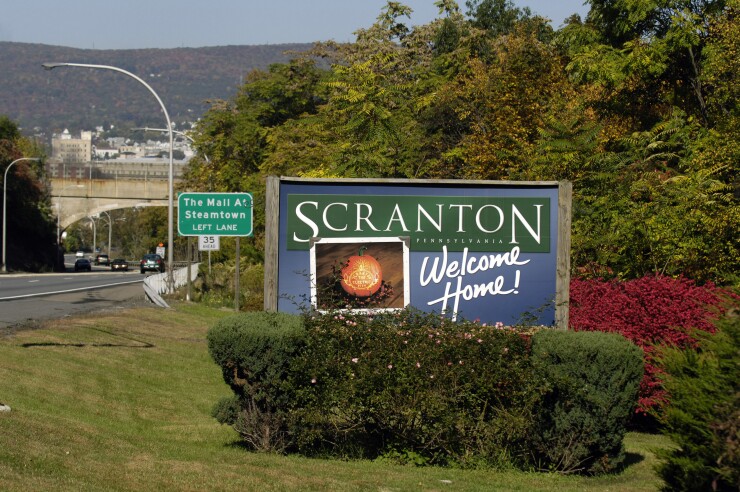A Lackawanna County, Pa., court reaffirmed its ruling that Scranton's home-rule charter does not supersede a state cap on tax collection.
Wednesday's decision could cost the distressed city millions of dollars.
Judge James Gibbons of the Lackawanna County Court of Common Pleas also ruled that the city could appeal the decision immediately to the Commonwealth Court of Pennsylvania.

"We see no need to reconsider our opinion," Gibbons said in his ruling. "We conclude, however, that our opinion contained a controlling question of law as to which there is a substantial ground for differing opinions.
"It is equally clear that an eventual appeal by either side is inevitable."
Gibbons had heard arguments on the city's motion May 30. Courtroom debate involved the primacy of Pennsylvania’s Act 511, a so-called local tax enabling act.
City attorneys, who said that Scranton has a home-rule charter and is not subject to a cap, sought to dismisss Gibbons' ruling in August that sided with a group of eight taxpayers led by mayoral candidate Gary St. Fleur, who claimed that Scranton has been collecting taxes beyond the legal limit.
Moody's Investors Service at the time called the ruling a credit negative for Scranton. “It may reduce tax revenue, which is a vital funding source for the city's operations,” Moody’s said in a commentary.
The group, consisting of residents and all subject to the local tax, includes St. Fleur, Nicholas Gettel, Casey Durkin, Damian Biancerelli, Rich Johnson, Ethan Green, Angela Gilgallon and Michele McGovern.
"This was an open-and-shut case from the onset," said St. Fleur. "The city of Scranton has been illegally taxing the people of Scranton for the past 10 years and it stops today. This ruling proves that the city of Scranton's recovery plan was dead on arrival because it required unlawful taxation."
St. Fleur said the city's only option is bankruptcy and he would pursue that option if elected.
Scranton, a 76,000-population county seat in northeast Pennsylvania, raised the levy from $52 to $156 for every person working within the city limits that earns at least $15,600. City officials called the tax increases essential for the their recovery under the state-sponsored Act 47 for distressed communities, to which Scranton has belonged since 1992.
The city intends to appeal.
“We are pleased that Judge Gibbons determined that there is substantial ground for difference of opinion as to the interpretation of the law applicable to this case, and look forward to presenting the issue to the appellate court,” Kevin Conaboy, who is representing the city, told the Times-Tribune newspaper.
Scranton, whose bonds are junk, received a general obligation upgrade from S&P Global Ratings in August to BB-plus from BB. The new rating is one level below investment grade.





